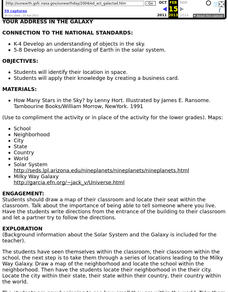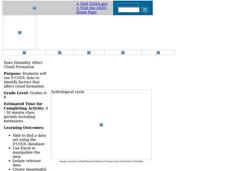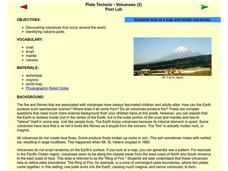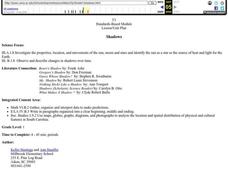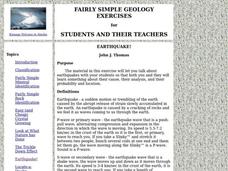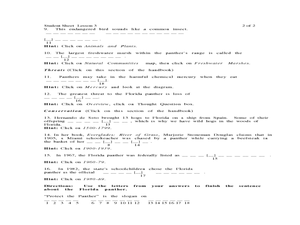Curated OER
Your Address in the Galaxy
Learners create a business card after researching their location in space and determining their Galactic Address.
Curated OER
Does Humidity Affect Cloud Formation?
Learners use NASA's S'COOL database to identify factors that affect cloud formation.
Curated OER
Petroglyphs: Protecting the Past
Fourth graders investigate the three types of rocks and study about petroglyphs. They explore why petroglyphs were used by the Nez Perce People. Students investigate the properties of the three types of rocks and they discuss cultural...
Curated OER
Plate Tectonic - Volcanoes Post Lab
Second graders discover volcanoes that occur around the world. They identifying volcano parts.
Curated OER
The Ozone Between Us
Students investigate how ground level ozone occurs in many areas of the country. They study the ozone problems that are associated with population centers.
Curated OER
Volcano!-Is That a Volcano on Your Plate?
Students explore how and where volcanoes form. They also explore how the interactions between oceanic and continental crust create volcanoes and other mountains and earthquakes in a simulation activity using cardboard of two thicknesses.
Curated OER
Let the North Star Tell You Where You Are
Students create an astrolabe and locate the North Star in the night sky. They determine the latitude of the North Star, and calculate an average latitude based on class results.
Curated OER
Climate Characteristics of Canadian Localities
Tenth graders match the climate data to a Canadian city. They justify their choice, referring to factors that affect climate. They use the Atlas of Canada's Advanced Search to locate specific communities.
Alabama Learning Exchange
Researching Hurricanes with Technology
Learners explain the components that make up a hurricane.
Curated OER
Using Triangulation to Locate Meteorites from Witnessed Falls
High schoolers participate in a mock investigation in which they must interview and record data given by 3 people ("witnesses") in an effort to triangulate the location of a meteorite.
Curated OER
Shadows
First graders measure how a shadow changes over the course of a day. They write about what they would do if they lost their shadow, and make silhouettes of themselves. Students make up a shadow dance and read stories about shadows.
Curated OER
Earthquake!
Students study causes, probability and location of earthquakes. They complete a number of activities and look at web pages to examine the characteristics of earthquakes.
Curated OER
Rising Tensions Over The Nile River Basin
Young scholars analyze the concept of global commons dilemma. In this investigative instructional activity students read an article on the Middle East Media Research Institute and answer questions accordingly.
Curated OER
Modeling Geologic Time
Students design, construct and interpret a model of geologic time and investigate change through geologic time.
Curated OER
Measuring Distance and Area in Satellite Images (College Level)
Students are able to download, install, and use Image J image analysis software to quantify change over time in satellite images. They access and download satellite images for specific locations and times. Students set a scale (spatial...
Curated OER
The Ocean Floor
Fifth graders discuss the process of sedimentation and the continental drift theory. They locate major structures on the ocean floor and they identify life forms at each level of the ocean.
Curated OER
Habitat Cards
Students discuss the relationship between a habitat and the environment. In groups, they use the internet to research the relationship between the animals and the habitat on their card. They present their information to the class to...
Curated OER
Introduction to the Planets
Students become familiar with the members of the solar system and planetary order. They identify differences and characteristics of individual planets. Finally students visualize the great size of the solar system and make the image more...
Curated OER
The Arctic Ocean
In this Arctic Ocean instructional activity, students read a 2 page passage, then complete 10 true/false questions. Answers are included on page 4. A reference web site is given for additional activities.
Curated OER
Rocks, Minerals, and Fossils
Fourth graders do 5 different lab stations to explore rocks, minerals, and fossils.
Curated OER
For Your Eyes Only
Students identify two major types of visible pollutants, smog, and particulate matter, They explain that air pollutants are generated during incomplete combustion. They measure and rank collectors from the most pollutants to the least...
Curated OER
Panther Scavenger Hunt
Pupils research a website to learn about the Florida panther. In this animal research instructional activity, students use the scavenger hunt directions to search a website about Florida panthers. Pupils also solve word puzzles within...
Curated OER
Sustainable Southern Belize: Coral Health Lesson Plan
Fifth graders investigate coral reefs and the dangers they face by labeling and drawing. In this oceanography lesson, 5th graders view a PowerPoint presentation of photographs of coral reefs in Belize. Students investigate...
Curated OER
People and Space
Students eat dehydrated foods that the astronauts would eat in space. In this dehydrated foods lesson plan, students make lists of food they could eat, discuss how dehydration takes place, eat food, and complete discussion questions.
